Rob Wickings's Blog, page 53
February 13, 2015
The Last Ever Speakeasy: Singles Going Steady
All good things must come to an end. After 18 months and a ton of fun, Rob and Clive have decided to shutter the Speakeasy. And what better way to finish than in the same way that we started: two blokes in a room, talking about music?
We’re talking about the art and joy of the single, using the examples that mean an awful lot to us. Expect revelations of a personal nature, and insights into who we are and how we got to be that way.
Settle in. This one’s gonna be emotional.
https://excusesandhalftruths.files.wordpress.com/2015/01/singleasy.m4a

February 9, 2015
Jupiter Ascending: In Defence Of Space Opera.
I feel like I'm in a very lonely place at the moment.
I must be, if the reviews and Twitter snarks are anything to go by, one of the few people who thoroughly enjoyed Jupiter Ascending, the new sci-fi romp by the Wachowskis. It's been decried as pretty but empty-headed, dull and silly.
That's not the film I saw, and I feel Jupiter Ascending needs someone to bat for it. Looks like I'm going to have to step up.
[From hereon in, consider Spoiler Alerts to be at RED.]
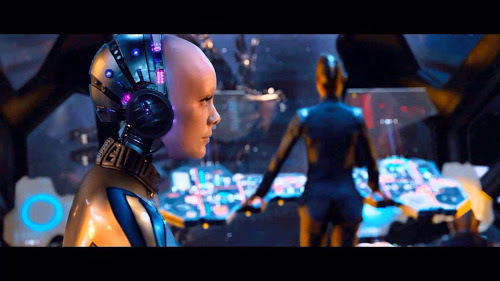
I have been a science-fiction fan for a very long time. Allow me to give you some sense of the scale we're talking about here: I remember going to the cinema for Saturday morning shows that would include a Children's Film Foundation feature, a cartoon and most importantly, an episode of Flash Gordon. In fact, when I was a youngling, Earth's blondest hero was everywhere, shown regularly on kid's TV. I developed a real love for this shonky, cheap but thrill-packed show. Flash Gordon is an ur-text for me, one of the cultural signifiers that would inform my tastes to this day. That's why, I guess, I keyed in so strongly to Jupiter Ascending from the very beginning.
Because it's a very cleverly constructed and loving tribute to the absurd, crazy world of pulp sci-fi in all its aspects.
The universe in which Jupiter Jones (I could spend another piece just discussing how appropriate that name is in context–let's just say for now I'd be very surprised if she didn't have a distant relative who's a whip-wielding archeologist) finds herself is 30s SF to the bone. It's ruled by corrupt royalty who see nothing wrong in using their subjects as they see fit. If this means distilling them to make a cure for old age, so be it. The Abrasax Family are merciless creatures, who take their cues from the Tudors. They are obsessed with only two things: power and bloodline. One ties neatly into the other. The balance is finely tuned, trembling always on the edge of collapse.
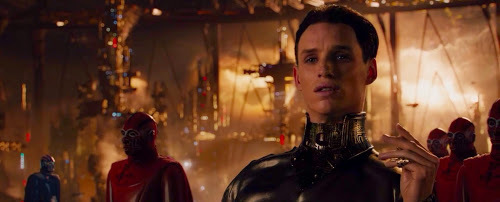 Balon: past-human
Balon: past-humanNotice my use of the word 'merciless' there. This is Ming's universe, a place where absolute power has corrupted absolutely. The Abrasax siblings have been alive for millenia, and are no longer human in any meaningful sense of the word. Eddie Redmayne plays Balon perfectly in this regard: still as an insect, and as free of any compassion. He looks pickled, badly preserved, like taxidermy gone wrong. His voice, a sick whisper, is the ghost of the real thing. Balon and his family are monsters, much like Ming, for the simple reason that they have forgotten what it means to be a part of the human race.
This is a universe of excess, of floating starship-palaces with chandeliers lighting the docking bays, of a visual aesthetic that clashes Egyptian, pre-Revolution France and Gothic design cues into a garish, eye-melting display. It's also home to a dizzying array of post-human 'splices': dog-soldiers, mouse-guards, elephant-pilots. Dr. Moreau's dream brought to life. If this film was nodding any harder at the universe of Flash Gordon and its beast-men, its head would come off.
 Travelling In Style
Travelling In Style
Into all of this comes Jupiter Jones, a girl who holds the genetic key to upset the Abrasax's carefully-maintained status quo. She's the fuse that lights the powder keg, and like Flash is largely the victim of circumstance. She's both pawn and player, an outside influence in a sealed world that doesn't quite know what to do with her. Apart from use her as a weapon, of course.
Flash Gordon would recognise this set-up: his ability to punch his way out of situations makes him a useful tool for pretenders to the throne like Prince Balin. Jupiter's attraction is more subtle: her DNA gives her power, and her marriage to Abrasax scion Titus is a purely political act. There's no love in it: the wedding is a means to an end. Again, we see that link to Tudor-style power-plays. If you're a man, your ability on the battlefield gives you the edge. A woman has more subtle, but no less deadly tools at her disposal (although Jupiter does use more direct means at the end of the film, beating Balon to a pulp with a lump of piping: this girl is a warrior too). Emperor Ming understands this perfectly, using his daughter Aura as both bait for the love-lorn Balin and a spy. When she becomes disloyal, when she dares to try to make a life that does not mesh with his plan, then he is appropriately merciless.
 Jupiter: fly girl
Jupiter: fly girlLet's step back a little and see what we have. A gilded and utterly corrupt world, ruled by cruel and inhuman creatures, is rocked to its foundations by a humble outsider with the heart to do what's right. That's Flash Gordon. It's also, of course, Star Wars. George Lucas would be the first to admit the debt his story owes to Flash. It's also telling that a lot of the accusations levelled at Jupiter Ascending can equally be pointed at Star Wars: good-looking but silly, old fashioned, terrible dialogue, wooden acting. None of which really matter as long as you follow the most important rule: don't be boring. Jupiter Ascending has its faults. But it's not a dull film by any means.
 Gene Genie
Gene Genie
While watching it, I was reminded of the movies that share its DNA: Dune and The Fifth Element, and TV shows like Farscape and Lexx. Big, bold, brave chunks of pulp that aren't afraid to be weird, camp, embracing the absurdity at the heart of space opera. I was raving about this film to an unconvinced colleague, who said “Yeah, but you're biased, Rob. You liked John Carter too.” He's so right. I will argue till I'm Mars-red in the face about the virtues of Andrew Stanton's much-maligned space opera, another ur-text that goes back even further than Flash Gordon's comic-book adventures across the moons of Mongo to the deep roots of SF. Maybe it's me, and I'm simply hard-wired to like this sort of movie. I'm disappointed, of course, that more people can't find the simple joy in a film like Jupiter Ascending. But ultimately, that's their loss. Like Jupiter's dad at the start of the film, I am transfixed by a starry night sky, wondering at the secrets and miracles strewn jewel-like across the darkness. I too dream of the adventures that play out in that most expansive of stages, of hurling a fragile craft out into the void, to take my place amidst the glorious and the strange.
If you're going to dream, you should always dream to the limits of your imagination. First star on the right. Straight on till morning.
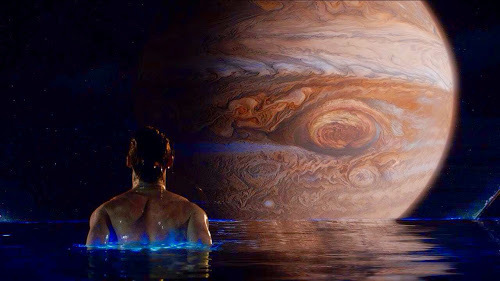 Out there. Thataway.
Out there. Thataway.

February 2, 2015
Considerations On The World, Mission And Methods Of The Kingsmen
(with, obviously, spoilers emplaced for those of you unlucky enough not to yet have seen the marvellous Kingsman: The Secret Service).
I worry, just a little, about the whole concept of the organisation known as the Kingsmen. Consider: they are independently funded and run without any sort of government oversight. With no need for contract work or any kind of secondary financial support, the Kingsmen are free to do what they like, regardless of the needs or restraints of national security. In fact, they believe such constraints to be a crutch to their work. They are a group of highly trained and heavily armed free agents with absolutley no accountability. Imagine if such an organisation could be penetrated and compromised. They claim to be a force for good, but that could very quickly be changed. The leadership structure of the Kingsmen, at least as far as I can tell, is do what Michael Caine tells you. Which, granted, is a reasonable way to do things, but in context a little more in the way of pushback would be prudent.
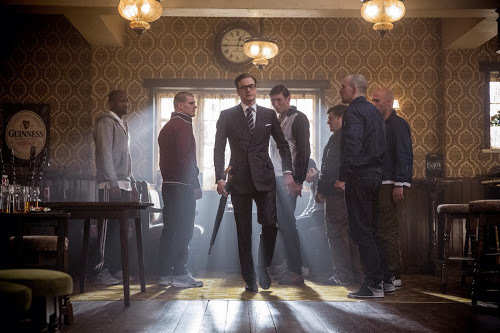
Why are there so few of these Kingsmen, especially when you take the size of their base and sheer outrageous wealth of their resources into consideration? The organisation clearly has the gelt to fund an army, and yet they choose to concentrate on ten men, sent out like knight errants with, it seems to me at least, little in the way of support. They're clearly successful at what they do, but then, let's refer back to my first point. The Kingsmen are free to do what they like. It seems to me that they'll pick and choose their assignments. No embeds in the Congo or Helmand for these chaps, I think. Only the glamorous missions where they get to wear the bespoke suits. To put it another way: The Kingsmen will only choose the missions where they are most assured of success. It's like private companies taking over bits of the NHS and only choosing to treat the patients that they could cure successfully and at the best profit point.
Not that that would ever happen, of course.
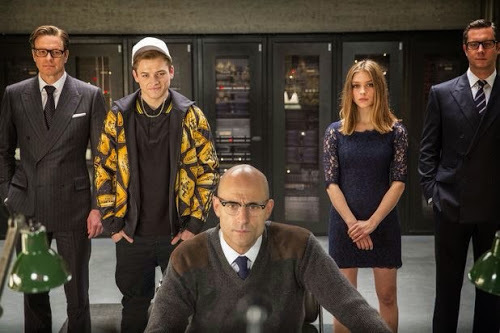
The Kingsmen are, clearly, a bunch of raving upper-class snobs, but the key point to note is again, the whole notion of the organisation not needing to worry about money. They are, effectively, a throwback to the era of the Victorian gentleman adventurer, who would cheerfully swan off to darkest Africa on a whim, without a care to mortgage, loans or financial responsibility. There's an argument going on about how the arts are increasingly becoming the playground of the rich—it's easier to make it as a musician if you never have to worry about rent money or where the next meal is coming from. Kingmen keys into that notion, and has a great deal of fun with it without becoming overly preachy.
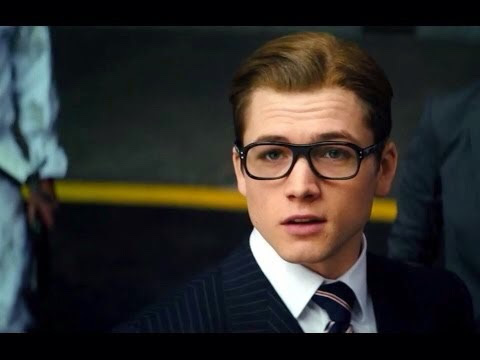
Although it's Eggsy's film, particularly in the final third, there's a few interesting nods towards the portrayal of women and the disabled in Jane Goodman's script. It would have been a different but no less interesting movie if Grace had been placed into the fray instead of the outsider from the council estate. After all, she's actually the one with the official status of Kingsman (Kingsperson?). She's not only sidelined, she's actively sent on a mission that highlights her weak points as a warrior. I was expecting her to roar in all guns blazing to save Eggsy at the act 3 turnaround: not letting that happen was a missed opportunity, I think.
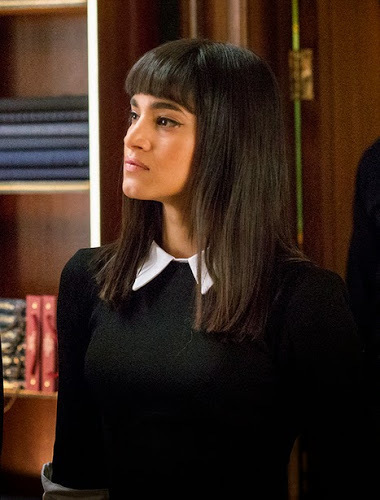
Gazelle is a different prospect, though. The Girl On Blades is a surprisingly positive portrayal of disability. Yes, she's a villain. Yes, she's (on the surface, at least) a servant. But she's also terrifyingly efficient and brutally effective as bodyguard, factotum and assassin. Her disability is never mentioned, apart from one sly moment where she's seen with one leg off, sharpening her heel. Otherwise, she's very much the equal of everyone else in the film. You could argue that para-athletes don't actually spend all their time in their running blades, and that they actually have different legs for different situations. A shame that wasn't explored a little more, perhaps, but in general it's good to see someone with a disability portrayed so glamourously, and very much as an equal—even if she is a threat rather than a hero.
Kingsman has innumerable sly nods to the world of fictional spydom, from the John Barry-esque music to the Harry Palmer-style glasses that everyone wears as heads-up displays cum communicators. It comes over as part celebration, part satire, part meta-commentary on the nature of the super-spy movie. This does, however, mean that any claims that it's a new type of spy film fail at the first post. No matter how much both Harry Hart and Sam Jackson claim “this isn't that sort of movie”, it really is. It's still about the unkillable guy in the tux who has sex with the lovely blonde as a sort of punchline. The Q-analogue gets more of an eyeful than he planned, and credits roll. “I think he's coming in for re-entry”. Kingsman is ultimately too beholden to the source material to be a genuinely new type of spy film, but by cranking all the references up to 11 it's at least a fun watch, which is more than you can say for the miserable, revisionist Skyfall. I wonder what the Bond camp thinks of it all.

January 19, 2015
Into The Woods And Over The Hills And Far Away
Disney's vision of the classic Sondhiem musical adds a hint of Hollywood but not much else.
Fairytales have always been a good place to play around for a writer. You're dealing with broad themes and archetypes, with narrative structures that are so well known that any skew from the accepted story adds a frisson of danger, of something experimental.
So it is with Stephen Sondheim's Into The Woods, a musical that mashes up many of the old stories to give them a new resonance. It was revolutionary when it was first released back in 1986. Since then we've seen a ton of different contemporary reimaginings of old tales, as everyone from Snow White to Jack The Giant Killer gets the high budget once-over. The movie version of Into The Woods enters a crowded market with Kenneth Branagh's version of Cinderella joining the spring schedules.
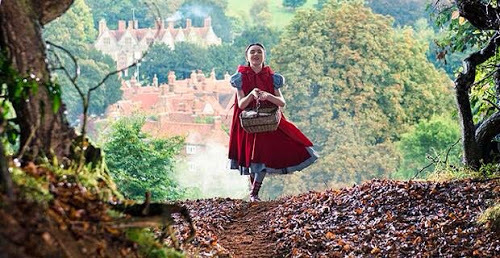 Hello, little girl.
Hello, little girl.So what does Rob Marshall's film have to offer? The notion of Meryl Streep as a singing witch might tickle the synapses. The notion of James Corden as a singing baker, maybe less so. There's been furore in the Broadway fanboy circle about Disney's insistance on a tone-down of some of Sondheim's bleaker moments. But on the whole, who wouldn't want to see a decent movie adaptation of an iconic piece of theatre?
Well, see, there's the thing. The two disciplines are surprisingly tough to transfer successfully from stage to screen and vicky verka. There have been many clunky, over-referential versions of stage plays that don't or daren't take risks with the core material. Into The Woods, with its big budget and starry cast, falls head-first into this trap. Some big moments in the movie are very much theatrical rather than cinematic conceits–take the sequence inside Johnny Depp's Wolf, all walls of billowing chiffon, or the barely-there giantess, surely a major threat who is simply hardly shown. The Woods of the title are an obvious soundstage from which there's little escape.
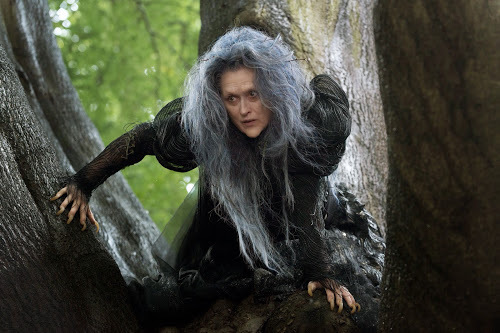 Streep: full-gas
Streep: full-gas
Marshall's timidity gives Into The Woods a strangely lumpen, uneven air. There's an awful lot of tell-not-show. We never see Jack in the land of giants, or Cinderella at the ball–Corden's voiceover does all the heavy lifting. The action moves in jarring segues that shove the story along rather than letting it move smoothly. We plod along for a while, then the brakes come off and we're five miles down the road, feeling that we've missed a couple of turnings.
The stage-bound feel extends, sadly, to the performances. The cast play it broad, for the most part, teeth and tits, pushing the performance out to the back rows. Anna Kendrick and Emily Blunt manage to put a little subtlety into their parts, but they're largely shouted down by Meryl Streep, blaring full-gas through a thick layer of make-up (practical or digital) or Chris Pine going the full Shatner as the Prince (although his admission of his nature to Cinders following infidelity is one of the smarter moments: “I was bred to be charming, not sincere.” A reminder that we're dealing with archetypes here. Placeholders, with a very limited set of character tropes. You could very easily roll dice to come up with something of equal complexity).
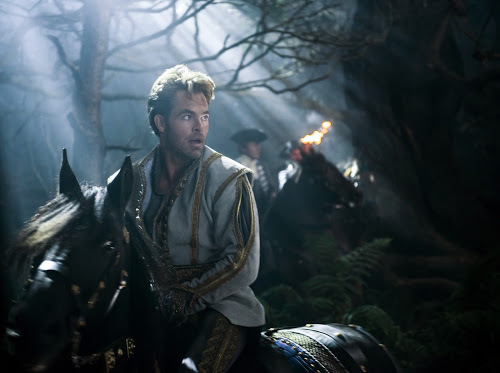 Pine: full Shat
Pine: full Shat
However, it would be churlish of me to hate on Into The Woods for being something that it clearly isn't. The great songs are delivered with conviction, and I was never less than entertained. Ultimately, though, it's hard to see the point of the film as anything other than a money-spinner, an attempt to keep the cross-pollination between film and theatre (and the flow of money thereof) galloping along. There have always been movie adaptations of great stage musicals, and Into The Woods is just another one of them. Nothing special.

January 16, 2015
Oscar Drops The Ball… again.
As usual, the announcements of the nominations for the 2015 Oscars have been met with howls of outrage and despair. There’s no pleasing everyone, of course, but this year Oscar’s choices seem particularly wrong-headed and blinkered.
The biggest issue for many is the lack of diversity in the films that were picked. Ava DuVernay’s Selma and Angelina Jolie’s Unbroken, both of which were hotly tipped for Best Film nods, lost out despite killer reviews and solid acclaim from the punters. Only Alejandro González Iñárritu falls outside the white male spectrum of Best Director nominees with Birdman, and even he’s no stranger to the statuette.
An Oscar film is nearly a genre in itself. Very specific types of movie, performance and mood are celebrated time and again, at the expense largely of more populist fare. However, both Selma and Unbroken are very much films of the Oscar type, and the smart money was on the two at least making the shortlist. Does their non-appearance fuel accusations of a voting panel that doesn’t like the idea of a female director? Could it be, as some commentors are claiming, that shunning Selma is tantamount to racism?
I’d urge caution here. After all, last year’s Best Film award went to 12 Years A Slave, which rocketed both Steve McQueen and Lupita Nyong’o into the limelight. Oscar can have its enlightened moments. But it’s glaringly obvious that there isn’t a coloured face in the Best Actor and Actress categories: the first time that’s happened since 1997, which is especially galling considering the powerhouse performance of David Oloweyo in Selma. It’s pretty clear that people are starting to call last year’s results a fluke, and the safe, dull list for 2015 a return to business as usual.
But the wrong-headedness continues across the board. Chris Miller and Phil Lord’s extraordinary The Lego Movie failed to got a nod in the categories that mattered, snagging only Best Song. More freakishly, the mighty Bill Plympton, who many had hoped to see in both Best Short and Best Animated Feature, was completely ignored. For fans of a film-maker at the top of his game, this is particularly frustrating.
I’ve long been of the opinion that Oscar is increasingly irrelevant, and this year’s nominations haven’t dissuaded me from that position. It’s good to have the argument about diversity, but as long as the voting panel is overwhelmingly made up of old rich white men, results like last year where a black man and a Mexican ruled the stage are always going to be a token aberration.

January 11, 2015
The Best Of 2014
Who does a best of the year show before the year’s up? Not us, hombre! We’ve made sure 2014 is good and dead before we drop our verdict.
Join Rob and Clive. with Speakeasy playmates Graham Williams, Keith Eyles, Chris Rogers, Simon Aitken, Neil Myers, Dominic Wade and Stuart Wright in our epic exploration of the art and events that made 2014 the fourteenth year of the 21st century.
Settle in. This is gonna be a long trip.
https://excusesandhalftruths.files.wordpress.com/2015/01/best-of-2014.m4a
Download the podcast here (right click)

January 9, 2015
The Pencil Is Mightier Than The Sword
If you ever wondered about the value and power of political cartooning, wonder no more.
In France’s worst terror incident in decades, twelve people were shot and killed in and around the Paris office of satirical magazine Charlie Hebdo on Wednesday. These included the editor, three other legendary cartoonists (Cabu, Tignous and Wolinski), and the two policemen assigned to their care and security. The gunmen left the scene shouting “we have avenged the Prophet”. The religious motivation for the crime seems clear.
Islam and Charlie Hebdo have history. The magazine, a mayfly in the face of many respected institutions, did what satire is supposed to do: poke, prod and annoy, all the while showing up the ludicrous hypocrisy and doublethink at the heart of said insitutions. Their robust attacks on Islam, which included pictures of Mohammed in the nude and a fundamentalist kissing Hebdo’s editor, had them up in court on numerous occasions, facing accusations of racism. They won more often than not. Free speech in France is scared, and it wasn’t as if the magazine was just hitting Islam as a target. Hebdo was cruel and provocative towards everyone: Catholic, Christian, left, right and centre politics – if it needed its bubble popping, Hebdo was there with a sharpened pencil.
How are we supposed to react when we come across a drawing that we find offensive? Do we fire off an angry letter? Do we threaten to sue? In the age of Twitter death threats and doxxing, do we publish the cartoonist’s home address and bank account details? To the staff of Charlie Hebdo, that would have been laughable. Their offices were firebombed in 2011, and there was a constant police presence at the door. They knew what they were up against with every picture.
They knew, and they did it anyway.
Cartoons have always been a great way to get a message across with economy and startling efficiency. The power of a well-crafted image cannot be exaggerated. For the fanatics who saw Hebdo as a threat, cartoons are especially dangerous. They dance past the ban on figurative art, while passing on a message of defiance that transcends language barriers. A good cartoon can hit home in the way that a well-written article simply can’t, particularly in areas where literacy is less prelavent than it should be. Since the graffitti of Roman times, people have used pictures to poke fun at figures of authority. Nothing’s changed. Sadly, it looks like the dangers involved in that simple act of protest are still as real as ever.
The protests in cities across the world, with thousands of people holding up pens in memory of the fallen is, I think, an image that the cartoonists of Charlie Habdo would have found hilarious. I don’t believe they viewed themselves as heroes, despite editor Stephane Charbonnier’s claims that he would rather die standing than on his knees. It’s a vainglorious quote that pokes fun at the image of a martyr–a mantle that he now may be donning whether he likes it or not. If his murderers wanted to scare cartoonists into silence, it looks like they’ve failed. A tidal wave of ink has risen in the last day or so, images of support, grief, mourning and defiance.
We need to understand that political cartoonists are journalists with a unique skillset. They can pinpoint an issue, condense it and deliver it with just a few lines of ink and the sweep of a brush. One worrying trend over the past few years is to treat journalists as targets in the cultural war being waged across the globe. 60 journalists were murdered last year. Half of those were Muslim. The people who aim guns at journalists don’t discriminate in terms of the faith of the man or woman behind the pen. They simply want them silenced. It’s imperative that we make sure the killers know that they will always, always fail.
Charlie Hebdo’s scurrilous and provocative pieces are not to everyone’s taste. That’s fine. The work that the magazine puts out is often crude, veering wildly from caricature to stereotype. But no matter what you think of the cartoons, Hebdo have the unassailable right to put it out there. If it provokes debate, so much the better. But no drawing, however blasphemous or offensive, should be the trigger for murder. There are some voices in the press that claim Charb and his fellow inkslingers somehow deserved what they got. They, too, have the right to say that. So I’ll simply respond to them, and the people that thought that the right to reply extended to a death sentence, with a drawing. It’s been the first time in a while that I’ve picked up a pen. It’s terrible that it takes a tragedy on this kind of a scale to inspire me to do so.
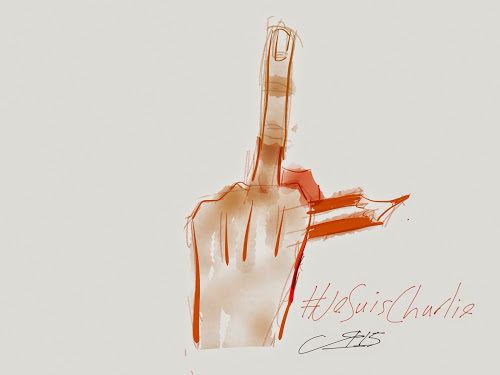

January 4, 2015
Wet, Dark And Wild No More
I come to celebrate, not to mourn. But that doesn’t mean I can’t be sad.
In a move last week that tilted the infant 2015 into ‘crappy’, friend of the blog (and good mate IRL) Kate Atherton announced that she was shuttering her long-running Jake Gyllenhaal fan-site, Wet Dark And Wild. I have many feels about this.
WDW, which was started in the wake of Jake’s remarkable performance in Brokeback Mountain, was a cornerstone of Gyllencentric fandom. Passionate, exhaustively researched and often very funny, it delved into the work and process of one of our most interesting actors with incisive detail. Sure, there were beefcake shots in there. Jake’s an attractive man. But WDW was never just fangirl squee. Kate is too good a writer to ever let the site devolve into gossip and tittle-tattle, and it was the only actor-centric site that I read on a regular basis. The rumour is that Jake did too.
So why now? Jake’s getting some of the best notices of his career for his remarkable turn as the reptilian Lou Bloom in Nightcrawler, with a good chance of an Oscar nod. His second collaboration with Denis Villeneuve, the Kafkaesque Enemy, is available on VOD as I write this. There’s even chatter about a release of Nailed, the David O. Russell comedy that fell into a funding black hole a few years back. Interest in our man Jake has never been stronger.
But time is a son of a bitch when you’re a writer, and Kate has hit the point where there’s simply too much else going on. Her book review site, For Winter Nights, is a great resource for the latest in SF, Fantasy and Hist Fic, and that’s where her energy and talent have increasingly been directed. She also points out that many of her original readers have moved on. The time just seemed right.
Rather than just delete the site, Kate’s letting it stand as a monument to past glories. As the designer of the site logo, this pleases me–even if she never did let me use the full res version of the artwork. Believe it or not, she’s happy with the jaggies on the text. Each to their own, I suppose.
The shuttering of any long-running blog is a time for sadness, but without Wet Dark And Wild Kate and I would never have met. I’m happy and grateful for that, and for the community that she gathered around her. As she points out in her emotional final post, she remains as much of a fan as ever, and you know she’ll be on the front line of any UK premiere Jake attends.
A good writer knows that, when something stops working, it’s time to let it go. Whether it be a cool line of dialogue, a scene that you’ve always been in love with, maybe even a title–if it slows you down, you have to lose it. Kate is a very good writer, and I look forward to seeing what comes next, whether with FWN or a new project. For now, though, I’m simply glad that WDW is there. A little shot of Gyllenhaal in the dark.

December 29, 2014
The Adventures Of Whip Crackaway And Honcho The Indian Boy
Yes, it’s been a while since we’ve posted. The reason? Clive and I have been working hard on the Speakeasy. Here’s the first fruit of our labours.
As a bit of a departure from our usual fare, The Speakeasy is proud to present its first foray into radio drama. With help from friends and contributors, Rob and Clive have put together a tribute and/or parody to classic 1930s horse operas. Please to enjoy the pantomimic stylings of the Speakeasy Players in…
THE ADVENTURES OF WHIP CRACKAWAY AND HONCHO THE INDIAN BOY.
Ask nicely, and we’ll never do it again.
The Speakeasy Players:
Clive Ashenden As Whip Crackaway
Rob Wickings as Honcho The Indian Boy
Simon Aitken as Hector Villianous
Alice H. DeVenns as Kitty Carmichael
Rick Bowsing as Pa
with special appearances from Graham Williams as Timmy
and Chris Rogers as The Voice Of Caversham Cigarettes.
The narrator is Kyle Eddley, who appears with the kind permission of Keith Eyles.
The show was written and directed by Rob Wickings, with production and sound design from our friends at All Hallows Post in Reading–‘the finest sound available anywhere’.
Poster design by courtesy of Ashenden Arts.
https://excusesandhalftruths.files.wordpress.com/2014/12/whip-crackaway.m4a

December 1, 2014
Movies Unwrapped: MOTHER OF TEARS
I have a good example of a film-maker who has, without question, destroyed every scrap of credibility he once had. The writer and director of some of the greatest horror films ever made, his output in the last 20 years has lurched from barely competant to outright laughable.
This time on Movies Unwrapped, I peel the plastic off the last movie of his that could at least be considered watchable. The film-maker is Dario Argento. The film is Mother Of Tears.
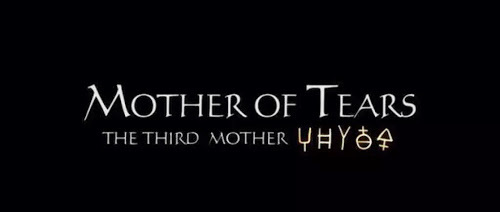
Mother Of Tears is the final film in the Suspiria Trilogy, apparantly, although the notion that there needed to be a third film to “complete the story” of the Three Mothers seems a bit contrived. Did Inferno leave plot threads hanging? Were fans clamouring to see the tale brought to a satifying conclusion? Well, they'd have been waiting for a while. There's a twenty year gap between Inferno and Mother Of Tears.
The movie has a simple premise. Excavations at an Italian church unearth a sealed box containing a set of artifacts: a dagger, three statues and a blood-red shirt. When the seal is broken, the artifacts wake the long-sleeping Mother Of Tears, who sets about that hoodoo that she doo so well: bringing pain, despair and misery to the earth. She isn't called the Mother Of Chuckles, after all. As her disciples flood into Rome and the streets devolve into riotous chaos, it's up to the girl who opened the box in the first place to save us from the evil witch…
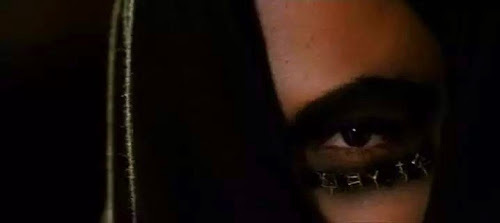
Mother Of Tears doesn't have the mood or atmosphere of its two older sisters, but there's plenty to please the hardcore horror fan. When it comes to the gore, Argento is as inventive as ever, and the gags are appropriately nasty. The performances too are generally good, with Asia Argento, the director's daughter and scream queen in her own right bringing in a solid, believable turn as the girl who has to save us all.
The script is another matter, reading like something that's been rush-translated by someone who only has a rough idea of the source language. Plot-wise, it's a bit of a mess too, flapping around the suspiciously empty streets of Rome with little real sense of forward motion. Perversely, it moves along quickly enough, but you get the feeling that Mother Of Tears is a bunch of gore-gags loosely strung together with a very basic plot.
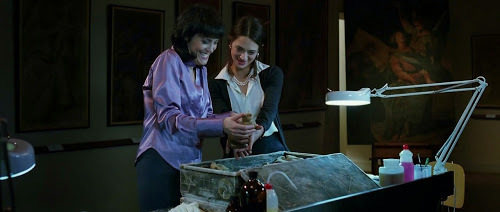 Crack open an ancient box chained up with loads of crosses... what could possibly go wrong?
Crack open an ancient box chained up with loads of crosses... what could possibly go wrong?Argento couldn't replicate the twitchy, febrile vibe of his earlier films, so he replaces it by upping the stakes with the splatter. No less than three under-fives are dispatched in fairly nasty ways, and there's no end of phallic skewerings and impalings. Freud would have a field day with this one.
By opening things out and attempting to show an apocalpse, Argento also overstretches himself. We never feel that Rome is collapsing into anarchy. Streets at night empty apart from an artfully-lit punch up hardly give us the impression that the end of days is round the corner. It looks like a rough night in Soho, is all. I did like the notion of the world's witches, gathering to worship at the second coming of their queen, clattering about like homicidal fashion models. But with hindsight, Mean Girls did it better.
As for the Mother herself, played with fearsome dedication by Israeli actress Moran Atias, I hate to say it but she's just too darn easy on the eyes. One shot where she lives up to her name by licking the tears from one of her suffering victims aside, you don't recoil from her in the same way as you would the corrupt and crumbling Mater Suspiria. She's just not nasty enough to be believable as the bringer of apocalypse. Of course, Argento is within his rights to cast an actress who looks good with her top off, but we lose the sake of menace. You shouldn't look forward to seeing the most powerful and wicked of the Three Mothers, surely.
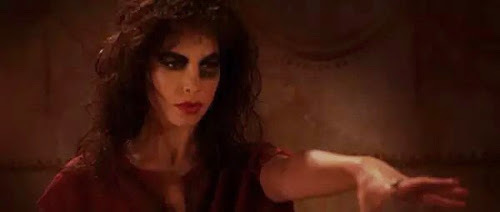 The evil and corrupt Mother Of Tears. PHWOAR.
The evil and corrupt Mother Of Tears. PHWOAR.
So, do I feel that Mother Of Tears is worth Unwrapping?
Well, that depends, really. Horror fans will find plenty to like here, and if I'm being honest it's a perfectly acceptable dose of Italo-horror: a bit kinky, very gory, rather silly. Argento fans have long been used to a series of diminishing returns from their hero, but this doesn't suck half as hard as Il Maestro's later output. If you don't expect a horror masterpiece, then there's a lot of fun to be had with Mother Of Tears.
I, however, am just left with the urge to watch Suspiria again.
Would you like to see Mother Of Tears for yourself? Here's your chance to win my copy. Just give me the Latin names of the Three Mothers in the comments. First correct answer wins.





